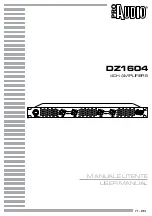
8
Introduction
Preamp
The Flex Pre is a two-channel preamp designed to work in conjunction
with the Flex Cab (or other powered cabinets) to implement a versatile
musical instrument amplification system. Or, it can operate as stand
alone preamp/direct box for performing or recording situations. It is a
high performance unit that combines two channels with four band EQ,
sophisticated filtering and digital effects into a compact unit. A signal
flow diagram is shown on page 9 along with illustrations of the front
and rear panels. Refer to these as needed when reading the following
description.
Note that all of the push button switches illuminate when they are in
the “on” position. So, a quick glance at the preamp will tell you which
functions have been engaged.
Also note that there are a few internal jumper options that can be
accessed when the front panel is removed. These options are
intended for the advanced user. They are available to add additional
functionality and are referenced in the description below. The jumper
locations are shown on page 13 and are noted on the signal flow
diagram.
Separate 1/4 inch and XLR jacks are used for the inputs to each
channel of their preamp. The 1/4 inch input has a 1 megohm input
impedance that is optimized to get the best sound from piezo pickups.
The XLR input is a low impedance balanced input with sufficient gain
to allow microphones to be plugged into it. There is a switchable 10 dB
gain to accomodate mics that need more gain. Phantom power is
available through the connector for powering a mic or outboard
preamp and can be activated using the push button switch located
next to the connector.
The
input jacks are separately buffered so both can be used at the same
time. Each channel is identical and can be blended to mix two
instruments, 2 microphones or a mic and an instrument thereby
performing much like a small PA system.
The Flex Pre has the following controls in each channel: input level,
Low, Lo Mid, Hi Mid and High tone controls. In addition, there is a
variable frequency low cut filter and a phase reverse switch in each
channel and a master level control that affects both channels.
Note that when the Flex Pre is used with the Flex Cab, there is a 5
to 10 second delay after the power has been turned before the
amp becomes operational. This is done so that “start up” noises
are not heard.
Inputs
To avoid an audible “pop”, set the input level
control all the way off when switching on the phantom power.
Controls
Flex Pre
Signal Flow Diagram
9
Low
High
Lo Mid
Freq
Tone
Controls
Ch1 Pre Out
Ch1 Effects
Loop
Ch2 Pre Out
Ch2 Effects
Loop
Headphone
I/O Boar
Hi Mid
Low Cut
Low
High
Lo Mid
Freq
Tone
Controls
Hi Mid
Low Cut
Power Supply
From
Flex
Cab
48 +V -V
From
18V
Ext
Supply
+10 dB
-6 dB
gain
jumper
-6 dB
gain
jumper
+10 dB
Ch 1
Ch 2
Phantom
Power
Phantom
Power
Input
Level
Input
Level
Simulated
Stereo Output
Note: all switches are illuminated
when in the on position
1 Reverb
2 Del/Rev
3 Del ay
10dB
2
1
3
Off
10dB
Front Panel
Summary of Contents for Flex Cab
Page 12: ...20 2013 Acoustic Image LLC...






























